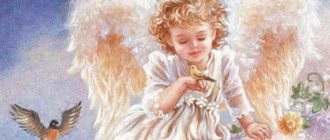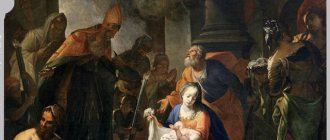The church calendar for 2021 will help you observe Orthodox traditions, thereby honoring the memory of your ancestors and becoming a little closer to God. It contains all the information about the dates of major holidays, days of remembrance of saints and fasting. According to old Orthodox traditions, in 2021 Christians can expect four strict fasts and many bright holidays.
Download our calendar in jpeg format and print it at home or at work.
In portrait orientation:
In landscape orientation:
Twelfth holidays in 2021
Twelve's
- These are the 12 most important holidays of the Orthodox calendar, dedicated to the events of the earthly life of Jesus Christ and the Mother of God. They are divided into two categories: 1) Impermanent - have a fixed date, falling on the same date every year. These include 9 twelve holidays and 2) Moving holidays - they have a unique date for each year, which depends on the date of Easter and moves with it. These include 3 twelve holidays.
- Christmas Day
- January 7, 2021. - Epiphany (Epiphany)
- January 19, 2021. - Presentation of the Lord
- February 15, 2021. - Entry of the Lord into Jerusalem (Palm Sunday)
- April 25, 2021. - Annunciation of the Blessed Virgin Mary
- April 7, 2021. - Ascension of the Lord
- June 10, 2021. - Trinity Day (Pentecost)
- June 20, 2021. - Transfiguration of the Lord
- August 19, 2021. - Dormition of the Blessed Virgin Mary
- August 28, 2021. - Nativity of the Blessed Virgin Mary
- September 21, 2021. - Exaltation of the Holy Cross
- September 27, 2021. - Presentation of the Blessed Virgin Mary into the temple
- December 4, 2021.
February
Meeting - one of the most significant twelve holidays of the year is celebrated on February 15th. It is permanent and falls annually on the 40th day after the Nativity of Christ. Believers on this day celebrate their meeting with God. In Rus', this holiday was especially loved also because severe frosts usually subsided by this time. A popular proverb says: “Candlemas—winter and summer meet.” Therefore, the last frosts and the first thaws were called Sretensky.
From the ancient church language, “sretenie” is translated as “meeting.”
Great Church holidays in 2021
The most important Orthodox holidays are distinguished by especially solemn divine services. The biggest and brightest event in the Christian church calendar is Easter. It has a special status and the most solemn service. The date of celebration is determined according to the solar-lunar calendar and is unique for each year (falls from April 4 to May 8).
- EASTER (Bright Resurrection of Christ)
- May 2, 2021
- Circumcision of the Lord (St. Basil the Great)
- feast day January 14, 2021. - The Nativity of John the Baptist
is a holiday on July 7, 2021. - Apostles Peter and Paul
- holiday July 12, 2021. - The beheading of John the Baptist
is a holiday on September 11, 2021. - The Protection of the Blessed Virgin Mary
is a holiday on October 14, 2021.
Folk calendar about every day
Every day one season always replaces another and this determines a person’s way of life. In connection with this, a folk calendar was formed in which there were practically no nameless, unmarked days. Every day was special, had its own purpose. All this was determined by climate conditions and astrological phenomena.
A calendar is a system for counting periods of time. The first calendars arose a long time ago, in ancient times, because there was a need to measure time. The word calendar comes from the Latin words caleo - to proclaim and calendarium - debt book. This is due to the fact that in Ancient Rome the beginning of each month was especially proclaimed, and because it was customary to pay debts on the first day of the month. Different peoples counted time differently. Some calendars are based on the changing phases of the moon - lunar calendars; in others - the change of seasons - sunny; in others, the length of the year was coordinated with the change of seasons, and the counting of months was associated with the phases of the Moon. Such calendars are called lunisolar.
In Rus', the calendar was called a monthly calendar. Every day, the month book covered the entire year of peasant life, “describing” day by day, month after month, where each day had its own holidays or weekdays, customs and superstitions, traditions and rituals, natural signs and phenomena. The cyclical nature of the calendar is reminiscent of human life, where spring is youth, summer is heyday, autumn is the time of harvesting fruits (it’s good if there are some, otherwise you can live your life without collecting fruits), winter is the time of wisdom and peace. This cyclicality and rhythm determined the way of life of the farmer. The folk calendar was an agricultural calendar, which was reflected in the names of the months, folk signs, rituals and customs. Even the determination of the timing and duration of the seasons is associated with real climatic conditions. Hence the discrepancy between the names of the months in different areas... Next: Folk calendar...
Middle Church holidays in 2021
- February 12, 2021 - Three saints - Basil the Great, Gregory the Theologian, John Chrysostom.
- May 6, 2021 - Great Martyr George the Victorious.
- May 21, 2021 - Apostle John the Theologian
- May 22, 2021 - St. Nicholas the Wonderworker (Summer Nicholas).
- May 24, 2021 - Equal to the Apostles Cyril and Methodius.
- July 28, 2021 - Equal to the Apostles Prince Vladimir.
- October 9, 2021 - Apostle John the Theologian.
- November 26, 2021 - St. John Chrysostom.
- December 19, 2021 - St. Nicholas the Wonderworker (Winter Nicholas).
Seasons
Seasons, four periods of the year (spring, summer, autumn and winter) characterized by certain average temperatures. The period during which the Sun passes through one of these sectors is called the season. Spring in the Northern Hemisphere and autumn in the Southern Hemisphere begin when the Sun passes through the initial circle of declination and its right ascension is 0° (vernal equinox). Summer in the Northern Hemisphere and winter in the Southern Hemisphere occur when the sun's right ascension is 90° (summer solstice). Autumn in the Northern Hemisphere and spring in the Southern Hemisphere begin when the sun's right ascension is 180° (autumnal equinox). The beginning of winter in the Northern Hemisphere and summer in the Southern Hemisphere is considered to be the winter solstice, when the direct ascension of the Sun is 270°... Next: Seasons. Russian folk calendar. Monthly words...
Church Orthodox fasts in 2021
Fast
– a period of food restriction during which you should refrain from eating food of animal origin.
There are 4 multi-day fasts: Great, Petrov (Apostolic), Assumption, Christmas and 3 one-day fasts: Epiphany Eve, Beheading of John the Baptist and Exaltation of the Cross of the Lord. There is also a fast on Wednesdays and Fridays.
Multi-day posts
- Lent in 2021
is from March 15 to May 1. - Petrov fast in 2021
- from June 28 to July 11. - Dormition Fast in 2021
- from August 14 to 27. - Christmas fast
- from November 28, 2021 to January 6, 2022.
One-day posts
- Wednesday and Friday throughout the year, with the exception of continuous weeks and Christmastide.
- Epiphany Christmas Eve
- January 18, 2021. - Beheading of John the Baptist
- September 11, 2021. - Exaltation of the Holy Cross
- September 27, 2021.
Continuous weeks with no fasting
Solid weeks
- these are the weeks during which fasting on Wednesdays and Fridays is canceled. There are 5 such weeks in a year: Christmastide, Publican and Pharisee, Cheese (meat is prohibited), Easter, Trinity.
- Christmas time in 2021
is from January 7 to January 17. - The Week of the Publican and the Pharisee in 2021
is from February 22 to February 28. - Maslenitsa in 2021 (Cheese Week)
- from March 8 to March 14. - Bright Easter Week in 2021
- from May 3 to May 9. - Trinity Week in 2021
- from 21 to 27 June.
Note!
According to the Church Charter, there is no fasting on the feasts of the Nativity of Christ and Epiphany, which occurred on Wednesday and Friday. On Christmas and Epiphany Eves and on the holidays of the Exaltation of the Cross of the Lord and the Beheading of John the Baptist, meals with vegetable oil are allowed. On the feasts of the Presentation, Transfiguration of the Lord, Dormition, Nativity and Intercession of the Most Holy Theotokos, Her Entry into the Temple, the Nativity of John the Baptist, the Apostles Peter and Paul, John the Theologian, which occurred on Wednesday and Friday, as well as in the period from Easter to Trinity on Wednesday and Friday Fish allowed.
Parents' Saturdays in 2021 (All Souls' Day)
On days of general remembrance of all deceased Christians, it is customary to visit the graves of deceased relatives and pray for them. In the circle of the liturgical year, such dates are: Ecumenical Parental Saturday, 2-4 Saturdays of Great Lent, Radonitsa, Commemoration of the Deceased Soldiers, Trinity and Dimitrievskaya Parental Saturdays.
- Ecumenical Parents' Saturday (Meat and Meat Saturday) in 2021
- March 6, 2021. - Saturday of the 2nd week of Great Lent
- March 27, 2021. - Saturday of the 3rd week of Lent
- April 3, 2021. - Saturday of the 4th week of Lent
- April 10, 2021. - Commemoration of deceased soldiers
- May 9, 2021. - Radonitsa in 2021
- May 11, 2021. - Trinity Parents' Saturday in 2021
- June 19, 2021. - Dimitrievskaya Parents' Saturday
- November 6, 2021.
May
On May 1, the strictest Central Lent of the year ends, and three important days await the Orthodox:
- May 2 - the most important Christian holiday of 2021 - Easter;
- May 9 is the day of remembrance of deceased soldiers;
- May 11 - Radonitsa (the first day of remembrance of the dead after Easter).
Christians celebrate Easter all month. In this regard, the Church allows concessions on fasting days of the week (Wednesday and Friday).
Orthodox church holidays in January 2021
- January 6
, 2021 - Christmas Eve. Strict post. - January 7,
2021, Thursday -
Nativity of Christ
(Nativity of our Lord Jesus Christ). - January 7 – 17,
2021 —
Christmastide
(holy days). Fasting is canceled and marriage is prohibited. Christmastide is dedicated to the joy of the Birth of Christ. The Church opposes fortune telling and other “abuses of superstition.” - January 14,
2021, Thursday -
Feast of the Circumcision of the Lord
and a day in honor of St. Basil the Great (IV century), compiler of the Divine Liturgy. New Year according to the old style. - January 15,
2021, Friday - The Church honors the memory* of St. Seraphim of Sarov, wonderworker (1833). ** - January 18
, 2021, Monday - Epiphany Christmas Eve. Strict post. As on Epiphany, the Great Blessing of Water takes place on Christmas Eve. - January 19,
2021, Tuesday -
Epiphany
, or Epiphany. In honor of the Baptism of Christ by the Prophet John the Baptist. At Epiphany, all aquatic life is sanctified; in churches, water is sanctified. - January 25
, 2021, Monday - Tatiana's Day - the day of the Most Holy Martyr Tatiana, who suffered for her faith. - January 27
, 2021, Wednesday - Equal to the Apostles Nina, enlightener of Georgia (336).









